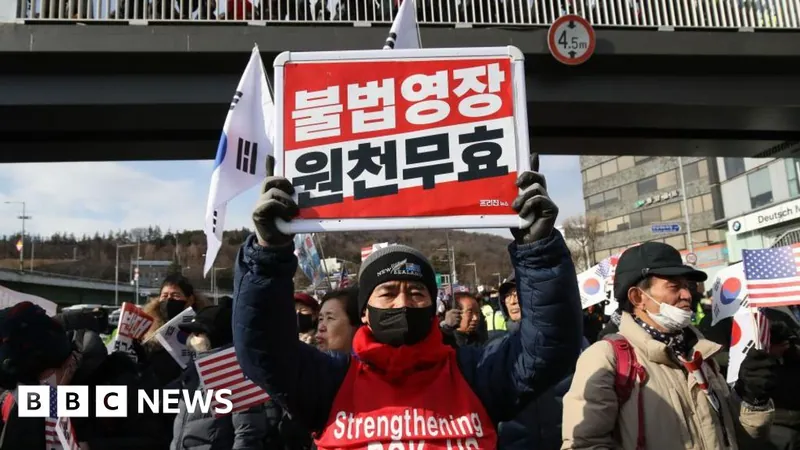
The Shocking Standoff: Why South Korea's President Yoon Suk Yeol Escaped Arrest
2025-01-03
Author: Yan
Dramatic Standoff with Police
In a dramatic and unprecedented turn of events, a tense six-hour standoff unfolded this past Friday as South Korean police attempted to arrest suspended President Yoon Suk Yeol. The operation, which began early in the morning, was abruptly called off after the police found themselves outnumbered by Yoon's ardent supporters and his protective security team.
Reasons for the Attempted Arrest
The police were acting on a warrant issued for Yoon's arrest due to his refusal to answer three summons for questioning regarding serious allegations against him. These include accusations of abusing his power and attempting to incite an insurrection with a controversial move to impose martial law in December. Had the arrest been successful, Yoon would have etched his name in history as the first sitting president of South Korea to be apprehended—a moment many in the country deemed unimaginable.
Escalation of Events
On the day of the attempted arrest, around 150 officers equipped with police vans saw the operation escalate dramatically. Initially starting with a small team of 20, they soon found their efforts thwarted by a significant crowd of pro-Yoon supporters gathered outside his residence in central Seoul, some of whom had camped out since before dawn. Signs reminiscent of the U.S. Capitol riots, such as “Stop the Steal,” showcased the charged political atmosphere surrounding the event.
Resistance from Security Forces
As investigators pushed to gain access to Yoon, they were met with resistance from presidential security personnel—who despite the president's suspended remain responsible for his safety—and a military unit charged with securing Seoul. The ensuing confrontation prompted officials to assess the situation, ultimately leading the Corruption Investigation Office (CIO) to announce that the arrest 'was practically impossible.'
Aftermath of the Attempted Arrest
Yoon's supporters erupted in victory chants while police acknowledged their concerns about potential injuries among the officers in the field, prompting the retreat. In the wake of the canceled operation, presidential security vowed to hold the CIO and police accountable for what they termed as an unlawful intrusion, claiming injuries had occurred among their staff during the tumult.
Looking Ahead: Potential for Future Confrontation
Looking ahead, the situation appears precarious. Investigators have until January 6 to execute the arrest before the warrant expires, leading to speculation that another attempt could emerge over the weekend. However, with public sentiment so fervently against law enforcement and the potential for increased numbers of protesters, any such operation would be fraught with challenges.
Legal Challenges for Yoon
Moreover, Yoon's legal representatives have expressed intentions to contest the arrest warrant on the grounds that the investigators exceeded their jurisdiction. Yoon's defiance draws scrutiny and criticism, particularly from opposition political leaders who accuse him of failing to accept accountability for his actions.
Implications for South Korea's Political Landscape
Yoon's legal team is reportedly assessing the situation closely, echoing sentiments of past political upheaval in South Korea. The CIO, despite only being formed in the wake of a prior presidential scandal, now faces scrutiny of its effectiveness, with experts predicting that any failure to successfully act against Yoon may undermine its authority in future cases.
Conclusion: Justice vs. Political Power
As the nation watches closely, the question remains: can South Korean authorities find a way to enforce justice against a leader defiant in the face of legal challenges? The outcome of this volatile situation could redefine the political landscape in South Korea and set precedents for how leaders are held accountable.

 Brasil (PT)
Brasil (PT)
 Canada (EN)
Canada (EN)
 Chile (ES)
Chile (ES)
 Česko (CS)
Česko (CS)
 대한민국 (KO)
대한민국 (KO)
 España (ES)
España (ES)
 France (FR)
France (FR)
 Hong Kong (EN)
Hong Kong (EN)
 Italia (IT)
Italia (IT)
 日本 (JA)
日本 (JA)
 Magyarország (HU)
Magyarország (HU)
 Norge (NO)
Norge (NO)
 Polska (PL)
Polska (PL)
 Schweiz (DE)
Schweiz (DE)
 Singapore (EN)
Singapore (EN)
 Sverige (SV)
Sverige (SV)
 Suomi (FI)
Suomi (FI)
 Türkiye (TR)
Türkiye (TR)
 الإمارات العربية المتحدة (AR)
الإمارات العربية المتحدة (AR)